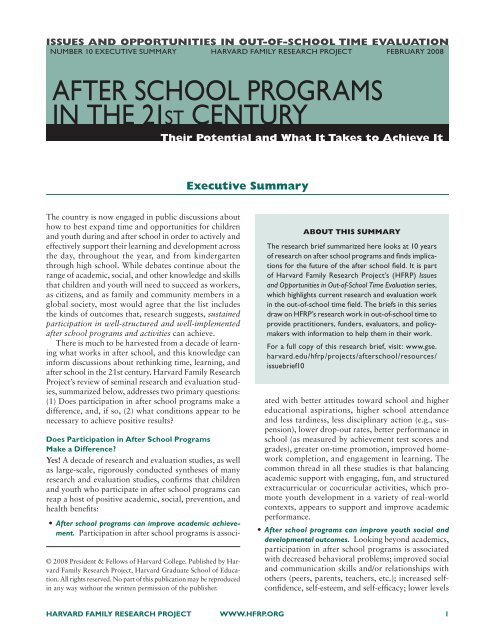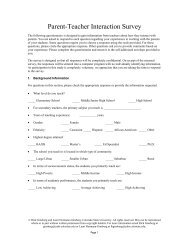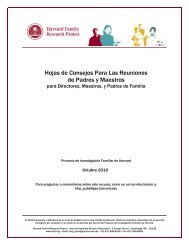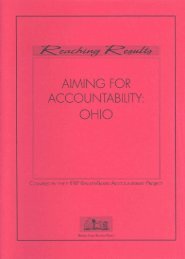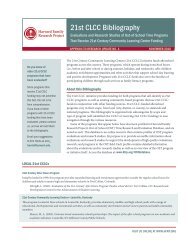aFter scHool Programs in tHe 21ST century - Harvard Family ...
aFter scHool Programs in tHe 21ST century - Harvard Family ...
aFter scHool Programs in tHe 21ST century - Harvard Family ...
Create successful ePaper yourself
Turn your PDF publications into a flip-book with our unique Google optimized e-Paper software.
Issues and Opportunities <strong>in</strong> Out-of-School Time Evaluation<br />
number 10 executive summary <strong>Harvard</strong> <strong>Family</strong> ReseaRch Project february 2008<br />
after school programs<br />
<strong>in</strong> the 21st Century<br />
<strong>Harvard</strong> <strong>Family</strong> Research Project<br />
Their Potential and What It Takes to Achieve It<br />
Executive Summary<br />
The country is now engaged <strong>in</strong> public discussions about<br />
how to best expand time and opportunities for children<br />
and youth dur<strong>in</strong>g and after school <strong>in</strong> order to actively and<br />
effectively support their learn<strong>in</strong>g and development across<br />
the day, throughout the year, and from k<strong>in</strong>dergarten<br />
through high school. While debates cont<strong>in</strong>ue about the<br />
range of academic, social, and other knowledge and skills<br />
that children and youth will need to succeed as workers,<br />
as citizens, and as family and community members <strong>in</strong> a<br />
global society, most would agree that the list <strong>in</strong>cludes<br />
the k<strong>in</strong>ds of outcomes that, research suggests, susta<strong>in</strong>ed<br />
participation <strong>in</strong> well-structured and well-implemented<br />
after school programs and activities can achieve.<br />
There is much to be harvested from a decade of learn<strong>in</strong>g<br />
what works <strong>in</strong> after school, and this knowledge can<br />
<strong>in</strong>form discussions about reth<strong>in</strong>k<strong>in</strong>g time, learn<strong>in</strong>g, and<br />
after school <strong>in</strong> the 21st <strong>century</strong>. <strong>Harvard</strong> <strong>Family</strong> Research<br />
Project’s review of sem<strong>in</strong>al research and evaluation studies,<br />
summarized below, addresses two primary questions:<br />
(1) Does participation <strong>in</strong> after school programs make a<br />
difference, and, if so, (2) what conditions appear to be<br />
necessary to achieve positive results<br />
Does Participation <strong>in</strong> After School <strong>Programs</strong><br />
Make a Difference<br />
Yes! A decade of research and evaluation studies, as well<br />
as large-scale, rigorously conducted syntheses of many<br />
research and evaluation studies, confirms that children<br />
and youth who participate <strong>in</strong> after school programs can<br />
reap a host of positive academic, social, prevention, and<br />
health benefits:<br />
© 2008 President & Fellows of <strong>Harvard</strong> College. Published by <strong>Harvard</strong><br />
<strong>Family</strong> Research Project, <strong>Harvard</strong> Graduate School of Education.<br />
All rights reserved. No part of this publication may be reproduced<br />
<strong>in</strong> any way without the written permission of the publisher.<br />
About This Summary<br />
The research brief summarized here looks at 10 years<br />
of research on after school programs and f<strong>in</strong>ds implications<br />
for the future of the after school field. It is part<br />
of <strong>Harvard</strong> <strong>Family</strong> Research Project’s (HFRP) Issues<br />
and Opportunities <strong>in</strong> Out-of-School Time Evaluation series,<br />
which highlights current research and evaluation work<br />
<strong>in</strong> the out-of-school time field. The briefs <strong>in</strong> this series<br />
draw on HFRP’s research work <strong>in</strong> out-of-school time to<br />
provide practitioners, funders, evaluators, and policymakers<br />
with <strong>in</strong>formation to help them <strong>in</strong> their work.<br />
For a full copy of this research brief, visit: www.gse.<br />
harvard.edu/hfrp/projects/afterschool/resources/<br />
issuebrief10<br />
• After school programs can improve academic achievement.<br />
Participation <strong>in</strong> after school programs is associated<br />
with better attitudes toward school and higher<br />
educational aspirations, higher school attendance<br />
and less tard<strong>in</strong>ess, less discipl<strong>in</strong>ary action (e.g., suspension),<br />
lower drop-out rates, better performance <strong>in</strong><br />
school (as measured by achievement test scores and<br />
grades), greater on-time promotion, improved homework<br />
completion, and engagement <strong>in</strong> learn<strong>in</strong>g. The<br />
common thread <strong>in</strong> all these studies is that balanc<strong>in</strong>g<br />
academic support with engag<strong>in</strong>g, fun, and structured<br />
extracurricular or cocurricular activities, which promote<br />
youth development <strong>in</strong> a variety of real-world<br />
contexts, appears to support and improve academic<br />
performance.<br />
• After school programs can improve youth social and<br />
developmental outcomes. Look<strong>in</strong>g beyond academics,<br />
participation <strong>in</strong> after school programs is associated<br />
with decreased behavioral problems; improved social<br />
and communication skills and/or relationships with<br />
others (peers, parents, teachers, etc.); <strong>in</strong>creased selfconfidence,<br />
self-esteem, and self-efficacy; lower levels<br />
<strong>Harvard</strong> <strong>Family</strong> ReseaRch ProjecT<br />
www.hfrp.org<br />
1
of depression and anxiety; development of <strong>in</strong>itiative;<br />
and improved feel<strong>in</strong>gs and attitudes toward self and<br />
school.<br />
• Participation <strong>in</strong> after school programs can have a positive<br />
impact on a range of prevention outcomes, <strong>in</strong>clud<strong>in</strong>g<br />
avoidance of drug and alcohol use, decreases <strong>in</strong><br />
del<strong>in</strong>quency and violent behavior, <strong>in</strong>creased knowledge<br />
of safe sex, avoidance of sexual activity, and reduction<br />
<strong>in</strong> juvenile crime.<br />
• Participation <strong>in</strong> after school programs can contribute to<br />
healthy lifestyles and <strong>in</strong>creased knowledge of nutrition<br />
and exercise. After school programs are one of many<br />
places that can tackle the grow<strong>in</strong>g problem of obesity<br />
among our nation’s children and youth. Health and<br />
wellness outcomes associated with participation <strong>in</strong> after<br />
school programs <strong>in</strong>clude better food choices, <strong>in</strong>creased<br />
physical activity, <strong>in</strong>creased knowledge of nutrition and<br />
health practices, reduction <strong>in</strong> BMI, improved blood<br />
pressure, and improved body image.<br />
Critical Factors to Achieve Successful Outcomes<br />
While it is true that after school programs have the<br />
potential to impact a range of positive learn<strong>in</strong>g and<br />
developmental outcomes, the reality is that some are not<br />
maximiz<strong>in</strong>g this potential. Research and evaluation po<strong>in</strong>t<br />
to three primary and <strong>in</strong>terrelated factors that are critical<br />
for creat<strong>in</strong>g positive sett<strong>in</strong>gs that can achieve positive<br />
youth outcomes:<br />
• Access to and susta<strong>in</strong>ed participation <strong>in</strong> programs.<br />
Many studies and research syntheses conclude that<br />
youth experience greater ga<strong>in</strong>s across a wide variety<br />
of outcomes if they participate <strong>in</strong> after school programs<br />
with greater frequency and <strong>in</strong> a more susta<strong>in</strong>ed<br />
manner. Susta<strong>in</strong>ed participation can be cultivated <strong>in</strong><br />
a number of ways, such as by tailor<strong>in</strong>g programs to<br />
youth <strong>in</strong>terests, needs, and schedules, as well as provid<strong>in</strong>g<br />
a wide variety of enrich<strong>in</strong>g opportunities for<br />
youth to be exposed to new ideas, new challenges,<br />
and new people.<br />
• Quality programm<strong>in</strong>g. Emerg<strong>in</strong>g research on after<br />
school program quality and its relationship to outcomes<br />
<strong>in</strong>dicates that, <strong>in</strong> addition to ensur<strong>in</strong>g adequate<br />
physical and psychological safety and effective management<br />
practices, quality after school programs also<br />
share the follow<strong>in</strong>g features: appropriate supervision<br />
and structure; well-prepared staff; <strong>in</strong>tentional programm<strong>in</strong>g<br />
with opportunities for autonomy and choice;<br />
and strong partnerships among the various sett<strong>in</strong>gs <strong>in</strong><br />
which program participants spend their day—that is,<br />
schools, after school programs, and families.<br />
• Strong partnerships. <strong>Programs</strong> are more likely to<br />
exhibit high quality when they effectively develop,<br />
utilize, and leverage partnerships with a variety of<br />
stakeholders, especially families, schools, and communities.<br />
However, strong partnerships are more than<br />
a component of program quality; they are becom<strong>in</strong>g<br />
a nonnegotiable element of support<strong>in</strong>g learn<strong>in</strong>g and<br />
development across all the contexts <strong>in</strong> which children<br />
learn and grow.<br />
Support<strong>in</strong>g Student Success Through After School<br />
A decade of research and evaluation studies provides<br />
powerful evidence that after school programs do work<br />
when the key factors described above are addressed. They<br />
also demonstrate how complex a task it is to provide highquality,<br />
effective supports for youth and their families.<br />
Clearly, there is a research warrant for cont<strong>in</strong>ued public<br />
and private support for after school <strong>in</strong>vestments. There is<br />
also an ever-louder national cry to reth<strong>in</strong>k time and learn<strong>in</strong>g.<br />
As national conversations turn toward a refram<strong>in</strong>g of<br />
the traditional school day and school year, there rema<strong>in</strong><br />
many valuable lessons and much guidance to be harvested<br />
from after school research and evaluation about what<br />
works to support student learn<strong>in</strong>g and success.<br />
About <strong>Harvard</strong> <strong>Family</strong> Research Project<br />
S<strong>in</strong>ce 1983, we have helped stakeholders develop<br />
and evaluate strategies to promote the well be<strong>in</strong>g<br />
of children, youth, families, and communities.<br />
Our work focuses primarily on three areas that<br />
support children’s learn<strong>in</strong>g and development—<br />
early childhood education, out-of-school time<br />
programm<strong>in</strong>g, and family and community<br />
support <strong>in</strong> education. Build<strong>in</strong>g on our knowledge<br />
that schools cannot do it alone, we also focus<br />
national attention on complementary learn<strong>in</strong>g.<br />
Complementary learn<strong>in</strong>g is the idea that a systemic<br />
approach, which <strong>in</strong>tegrates school and nonschool<br />
supports, can better ensure that all children have<br />
the skills they need to succeed. Underp<strong>in</strong>n<strong>in</strong>g all our<br />
work is our commitment to evaluation for strategic<br />
decision mak<strong>in</strong>g, learn<strong>in</strong>g, and accountability.<br />
<strong>Harvard</strong> <strong>Family</strong> Research Project<br />
3 Garden Street, Cambridge, MA 02138<br />
Tel: 617-495-9108 Fax 617-495-8594<br />
Email: hfrp_pubs@gse.harvard.edu.<br />
Website: www.hfrp.org<br />
<strong>Harvard</strong> Graduate School of Education<br />
<strong>Harvard</strong> <strong>Family</strong> ReseaRch ProjecT<br />
www.hfrp.org<br />
2


